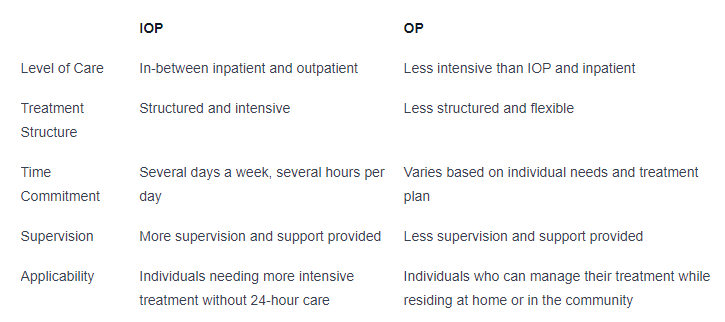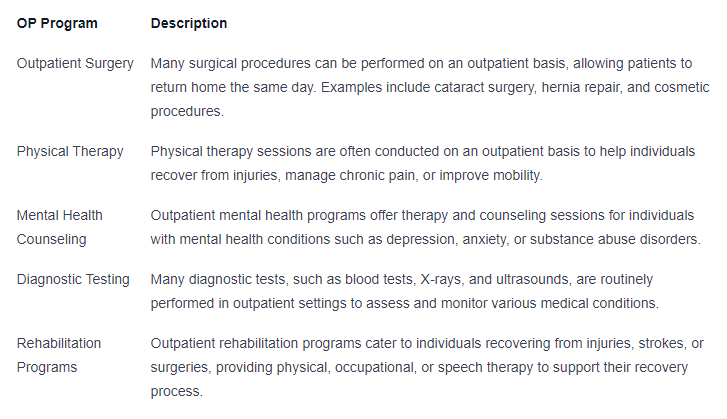IOP vs OP: What's the Difference Between the Two?

Understanding IOP and OP
When it comes to healthcare treatment options, two terms that often come up are IOP (Inpatient Outpatient) and OP (Outpatient). These terms refer to different levels of care and have distinct characteristics. Let's dive into what IOP and OP entail and explore the key differences between them.
What is IOP?
IOP, or Inpatient Outpatient, refers to a level of care that falls between inpatient and outpatient treatment. It is designed for individuals who require more structured and intensive treatment than what outpatient services can provide, but do not need round-the-clock care in a hospital or residential setting.
IOP programs typically involve a combination of group therapy, individual therapy, and educational sessions. They are often used to provide ongoing support and treatment for mental health disorders, substance abuse, and other behavioral health conditions. IOP programs usually require a significant time commitment from participants, with sessions scheduled several days a week, for several hours each day.
What is OP?
OP, or Outpatient, refers to a level of care that allows individuals to receive treatment while still residing at home or in their communities. Outpatient services are less intensive and structured compared to inpatient or IOP programs. They are suitable for individuals who do not require 24-hour supervision or more intensive treatment modalities.
OP programs offer flexibility in scheduling and allow individuals to attend therapy sessions, medical appointments, and other necessary treatments on an outpatient basis. This level of care is commonly used for routine medical care, minor surgeries, physical therapy, counseling, and various other healthcare services.
Key Differences Between IOP and OP
Here are the key differences between IOP and OP:

Understanding these differences between IOP and OP is essential when considering the most appropriate level of care for specific healthcare needs. The decision should be based on factors such as the severity of the condition, treatment goals, and the recommendation of healthcare professionals. Consulting with a healthcare professional can help determine whether IOP or OP is the right choice for an individual's unique situation.
IOP (Inpatient Outpatient)
When comparing IOP (Inpatient Outpatient) and OP (Outpatient), it's important to understand the unique characteristics and differences of each. In this section, we will focus on IOP, providing a definition, outlining its characteristics, and exploring common uses and examples of IOP programs.
Definition and Characteristics of IOP
IOP, also known as Inpatient Outpatient, is a level of care that falls between inpatient and outpatient treatment. It offers a more intensive treatment structure than traditional outpatient programs but does not require individuals to stay overnight in a facility.
IOP programs typically consist of a series of structured therapy sessions, conducted in a group or individual setting. These programs may span several weeks or months, depending on the specific needs of the individual. The frequency and duration of sessions can vary, but most IOP programs involve multiple sessions per week.
One of the defining characteristics of IOP is the level of support and supervision provided. While individuals in IOP programs do not stay overnight, they receive comprehensive care during their scheduled sessions. This may include therapy, counseling, medication management, and other evidence-based treatments to address the specific condition or concern.
IOP programs are often recommended for individuals who require more intensive treatment than what outpatient programs can provide but do not require 24-hour medical supervision. It serves as a bridge between inpatient care and returning to daily life, offering a structured and supportive environment to address the individual's needs.
Common Uses and Examples of IOP Programs
IOP programs can be utilized for various mental health and substance abuse conditions. Some common uses of IOP include:
- Substance Use Disorders: IOP programs can be effective in treating substance use disorders, providing comprehensive support and therapy to individuals in recovery. These programs may focus on detoxification, relapse prevention, and developing coping skills.
- Mood Disorders: IOP programs may be utilized for individuals with mood disorders such as depression or bipolar disorder. These programs often include therapy sessions aimed at managing symptoms, improving mood regulation, and enhancing overall well-being.
- Eating Disorders: IOP programs can be beneficial for individuals with eating disorders, offering a structured treatment approach that addresses the complex nature of these conditions. These programs may focus on nutritional counseling, therapy, and establishing healthier eating habits.
Here is a table summarizing the key characteristics of IOP programs:

IOP programs provide individuals with a level of care and support that is tailored to their specific needs. By offering a structured treatment approach outside of a hospital or residential setting, IOP programs aim to help individuals make progress towards their recovery goals while maintaining their daily routines and responsibilities.
OP (Outpatient)
When it comes to healthcare treatment, outpatient (OP) programs offer an alternative to the more intensive inpatient care. Outpatient services allow individuals to receive medical care, therapy, or treatment without the need for overnight stays. Let's explore the definition and characteristics of OP, as well as common uses and examples of OP programs.
Definition and Characteristics of OP
Outpatient care refers to medical services or treatment that is provided on an outpatient basis, meaning patients visit a healthcare facility for their appointments and return home the same day. OP services are typically less intensive and do not require hospitalization or overnight stays. Instead, patients can receive treatment during scheduled appointments, allowing them to maintain their regular daily routines.
Some key characteristics of outpatient care include:
- Flexibility: OP programs provide greater flexibility in terms of scheduling and time commitment compared to inpatient programs. Patients can often choose appointment times that are convenient for them, minimizing disruption to their daily activities.
- Less Restrictive Environment: Unlike inpatient programs, outpatient care allows individuals to remain in their own homes and communities while receiving treatment. This can contribute to a sense of comfort and familiarity, which may be particularly beneficial for individuals with supportive social networks.
- Lower Cost: Outpatient care is generally more affordable than inpatient care due to lower facility and staffing costs. This can make it a more accessible option for individuals who do not require intensive, round-the-clock medical supervision.
Common Uses and Examples of OP Programs
Outpatient care is utilized across various healthcare disciplines to provide a wide range of services. Some common uses and examples of OP programs include:

Outpatient programs play a vital role in providing accessible and convenient healthcare services to individuals who do not require intensive inpatient care. Whether it's for surgical procedures, therapy sessions, diagnostic tests, or rehabilitation programs, OP offers a flexible and cost-effective approach to receiving necessary medical treatment while maintaining one's daily routine.
Comparing IOP and OP
When considering the difference between IOP (Inpatient Outpatient) and OP (Outpatient) programs, several factors come into play. In this section, we will compare these two treatment options in terms of treatment intensity and structure, time commitment and flexibility, as well as cost and insurance coverage.
Treatment Intensity and Structure
IOP programs typically involve a more intensive level of care compared to OP programs. They are designed for individuals who require a higher level of support and monitoring but do not need 24-hour supervision. In an IOP, patients attend therapy sessions and receive comprehensive treatment for a set number of hours per week. This structured approach allows for focused and targeted therapy to address specific needs.
On the other hand, OP programs offer a less intensive level of care. Patients attend therapy sessions on an outpatient basis, typically for a few hours per week. OP programs are suitable for individuals who require ongoing treatment and support but do not need the level of intensity provided by an IOP.
Time Commitment and Flexibility
When it comes to time commitment, IOP programs generally require a more significant investment of time compared to OP programs. Patients in IOP programs may need to attend therapy sessions for several hours each day, multiple days per week. The structured nature of IOP treatment ensures that patients receive the necessary support and intervention.
In contrast, OP programs offer greater flexibility in terms of scheduling and time commitment. Patients attend therapy sessions for a few hours per week, allowing them to continue with their daily routines and responsibilities.
Cost and Insurance Coverage
The cost of treatment can vary between IOP and OP programs, depending on factors such as location and specific treatment services. Generally, IOP programs tend to be more expensive due to their higher level of intensity and comprehensive support. The cost of an IOP can be influenced by factors such as therapy sessions, medication management, and additional services provided.
On the other hand, OP programs are typically more cost-effective as they involve fewer hours of therapy and less comprehensive support. This can make them a more affordable option for individuals who require ongoing treatment but have a lower budget.
Insurance coverage for IOP and OP programs can vary depending on the specific insurance plan. It's essential to check with your insurance provider to understand the extent of coverage for each type of treatment. Many insurance plans cover both IOP and OP programs, but the level of coverage may differ.
When deciding between IOP and OP, it's important to consider the individual's treatment needs, availability, and financial situation. Consulting with a healthcare professional can provide valuable insights and guidance to determine the most appropriate treatment option for each unique situation.
Which is Right for You?
When deciding between IOP (Inpatient Outpatient) and OP (Outpatient) programs, there are several important factors to consider. Understanding these factors can help you make an informed decision about which treatment option is right for you.
Factors to Consider
- Treatment Needs: Assess your treatment needs and the severity of your condition. If you require more intensive care and supervision, IOP may be the appropriate choice. On the other hand, if your condition is less severe and you can manage treatment while living at home, OP may be a suitable option.
- Treatment Intensity: Consider the level of structure and intensity you require for your treatment. IOP programs typically involve more frequent and longer treatment sessions, often resembling a full-time program. OP programs, on the other hand, offer more flexibility with fewer treatment hours per week. Evaluate your ability to commit to the necessary treatment intensity.
- Time Commitment: Reflect on your daily responsibilities and availability. IOP programs may require a significant time commitment, potentially disrupting work or other obligations. OP programs offer more flexibility, allowing you to schedule treatment around your existing commitments. Assess your ability to balance treatment with your daily routine.
- Cost and Insurance Coverage: Determine the financial implications of each option. IOP programs generally involve higher costs due to the extended treatment hours and additional resources provided. OP programs tend to be more cost-effective. Consult your insurance provider to understand coverage for both options and evaluate the financial impact.
- Support Network: Consider the strength of your support network, including family, friends, and healthcare professionals. IOP programs often provide a more comprehensive support system, including regular therapy sessions and group activities. OP programs may rely more on external support networks. Assess the availability and effectiveness of your support system.
Consulting with a Healthcare Professional
When making a decision about IOP vs OP, it's crucial to consult with a healthcare professional. They can provide personalized guidance based on your specific needs and circumstances. A healthcare professional will assess your condition, evaluate the treatment options, and help you determine the most suitable choice.
Be sure to provide accurate and honest information about your condition, treatment history, and personal circumstances. This will enable the healthcare professional to guide you effectively and ensure that you receive the appropriate level of care.
Remember that the decision between IOP and OP is not one to be made lightly. It's important to consider all the factors mentioned above and consult with a healthcare professional who can offer expert advice tailored to your individual needs. By taking these steps, you can make an informed decision that aligns with your treatment goals and supports your journey towards recovery.
Sources:
IOP vs OP: What's the Difference Between the Two?
